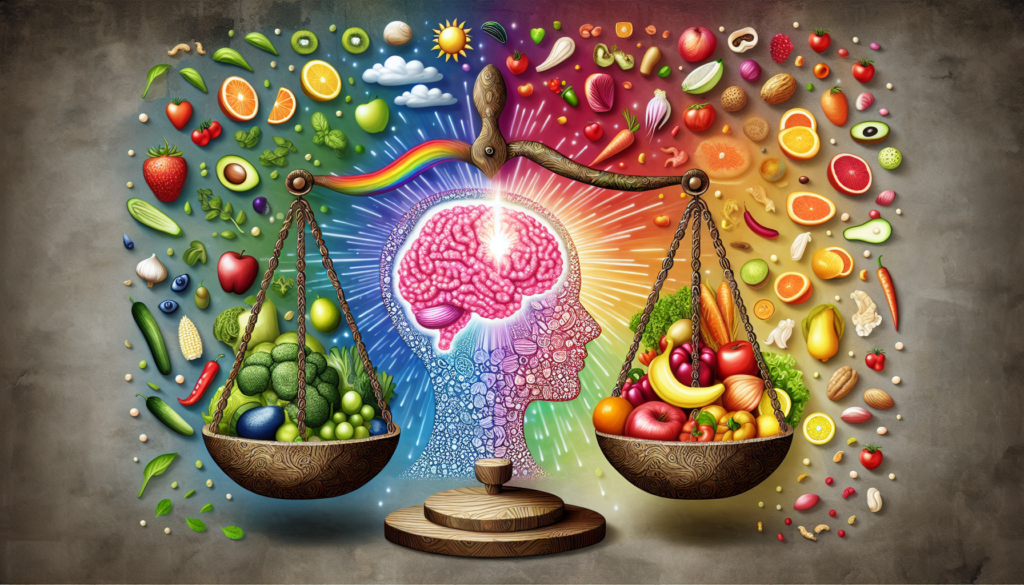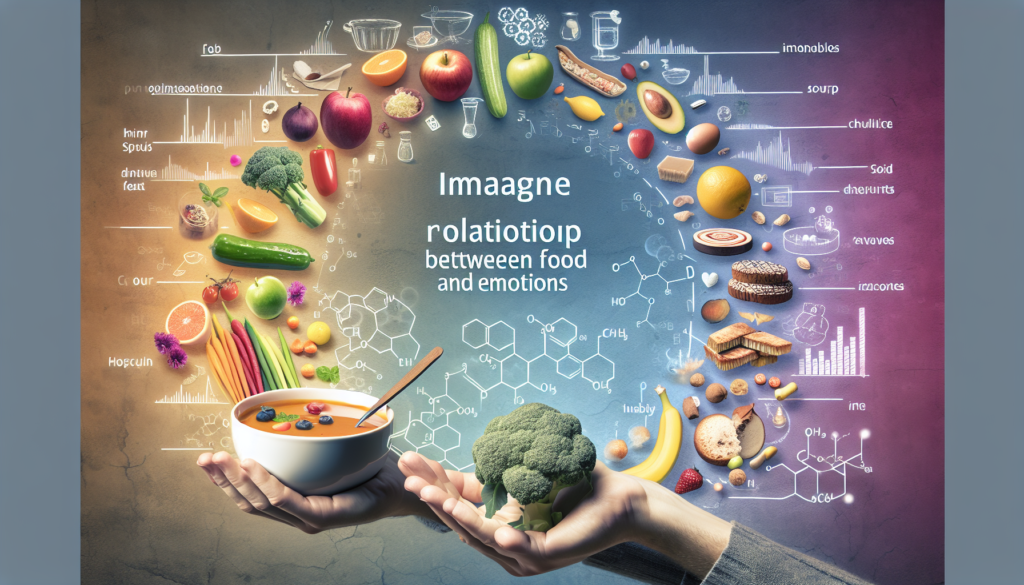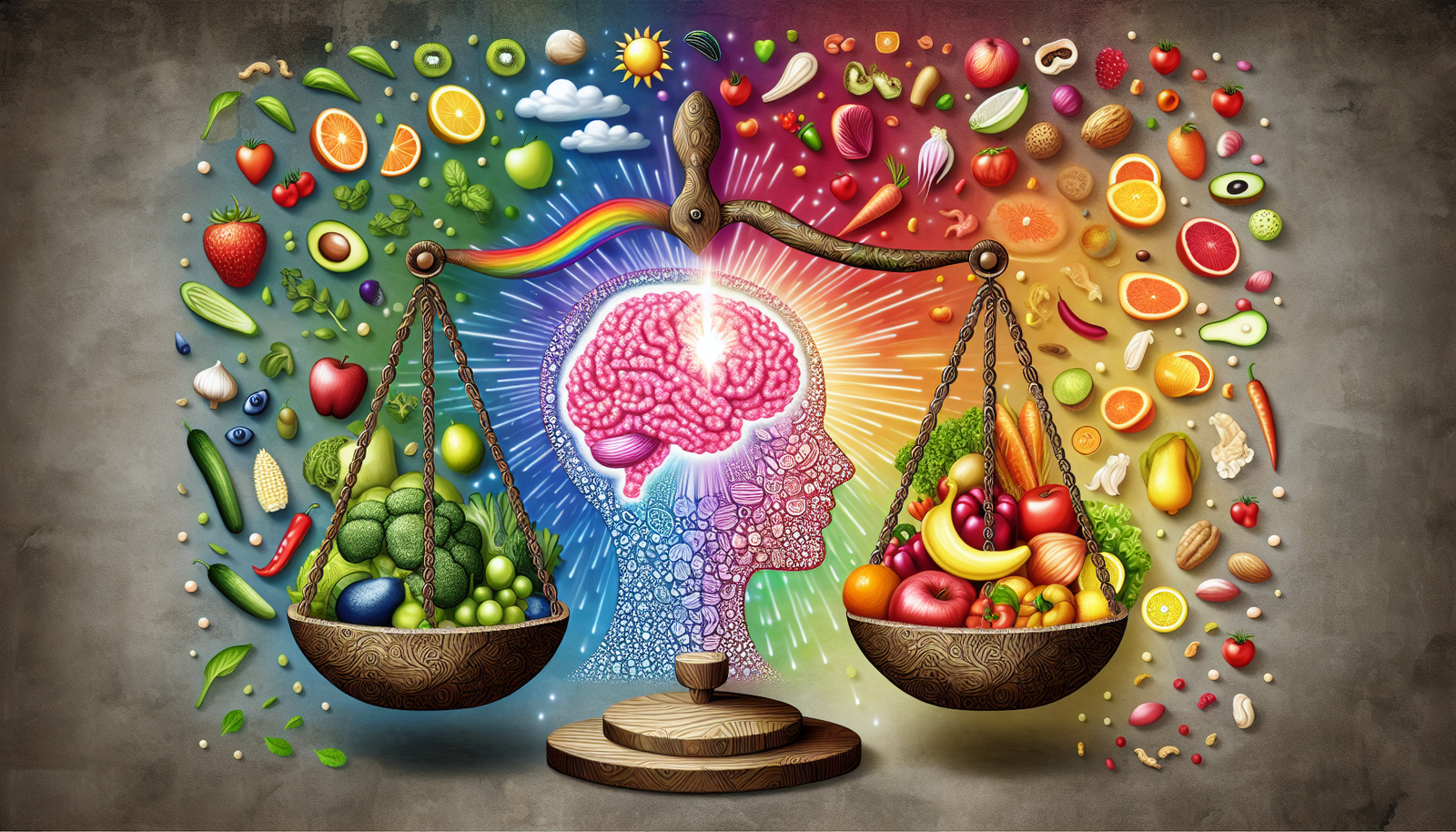Imagine a world where a simple meal could instantly bring a smile to your face and fill you with a sense of joy. This is not just wishful thinking, but rather a fascinating reality that has been scientifically proven. In this article, we will explore the incredible link between food and happiness, uncovering the hidden secrets behind why certain foods can uplift our spirits and enhance our overall well-being. Get ready to embark on a mouthwatering journey where flavors and emotions intertwine, leaving you with a newfound appreciation for the power of food to nourish not just our bodies, but also our souls.

The physiological connection
Hormonal influence on mood
Your hormonal balance plays a significant role in regulating your mood and overall well-being. The foods you consume can have a direct impact on your hormonal levels, thus affecting your mood. For example, certain foods can cause an increase in the production of serotonin, which is often referred to as the “feel-good” hormone. Serotonin helps to regulate mood, appetite, and sleep patterns. Consuming foods rich in tryptophan, such as turkey, eggs, and pumpkin seeds, can boost serotonin levels and promote a positive mood.
Effects of nutrient deficiencies
Nutrient deficiencies can have a profound impact on your mental and emotional state. When your body lacks essential nutrients, it can lead to imbalances in neurotransmitters and hormones, negatively affecting your mood. For instance, deficiencies in B vitamins, such as folate and vitamin B12, have been associated with an increased risk of depression and low energy levels. Similarly, inadequate intake of omega-3 fatty acids, commonly found in fatty fish like salmon and sardines, may contribute to feelings of sadness and anxiety. Ensuring a well-rounded and nutrient-dense diet can help prevent these deficiencies and support your mental well-being.
The psychological connection
Emotional and psychological benefits of certain foods
Certain foods have been found to have emotional and psychological benefits, contributing to an improved mood and overall happiness. For instance, dark chocolate contains compounds that stimulate the production of endorphins, which are natural mood-enhancers. Additionally, foods rich in antioxidants, such as berries, can help reduce inflammation and oxidative stress in the brain, promoting cognitive function and a positive mental state. Incorporating these foods into your diet can provide both physical nourishment and psychological well-being.
Impact of taste and flavors on mood
It’s no secret that the taste and flavors of food can significantly impact your mood. Enjoying a delicious meal can elicit feelings of pleasure and satisfaction, enhancing your overall well-being. The taste buds in your mouth send signals to your brain, triggering the release of dopamine, a neurotransmitter associated with pleasure and reward. This explains why certain flavors, such as sweet or savory, can evoke positive emotions and uplift your mood. By savoring and appreciating the flavors in your meals, you can create a positive connection between food and your emotional state.
The social connection
Food as a means of social bonding
Food has always been a powerful tool for social connection and bonding. Sharing a meal with family or friends can create a sense of togetherness and strengthen relationships. The act of preparing a meal together and sitting down to enjoy it fosters a warm and comfortable environment where people can relax and engage in meaningful conversations. Whether it’s a traditional family dinner or a gathering of friends for a potluck, the shared experience of food brings people together and enhances their overall happiness.
Festive occasions and happiness
Festive occasions and celebrations are often centered around food, and for good reason. These events provide an opportunity for individuals to come together and indulge in delicious meals, creating a sense of joy and happiness. Whether it’s a holiday feast or a special occasion like a birthday or wedding, the anticipation of enjoying tasty food and sharing laughter with loved ones can elevate your mood and contribute to a memorable experience. These moments of celebration and culinary delight add rich layers to our lives and contribute to our overall happiness.
The cultural connection
Food as a reflection of cultural identity
Food is deeply intertwined with cultural identity, serving as a reflection of traditions, beliefs, and values. Each culture has its unique culinary traditions and customs, which play a vital role in shaping individuals’ sense of belonging and happiness. Exploring and embracing your cultural cuisine can evoke a sense of nostalgia and connection to your roots, enhancing your overall well-being. The flavors, aromas, and rituals associated with traditional dishes can transport you back to cherished memories, providing a sense of comfort and happiness.
Traditional dishes and nostalgic happiness
Traditional dishes have the power to evoke a strong sense of nostalgia and evoke feelings of happiness. Each bite can transport you back to fond childhood memories, family gatherings, or special moments spent with loved ones. The familiarity and comfort associated with traditional dishes can act as a source of emotional support and provide a sense of security and happiness. Taking the time to prepare and savor these dishes can rekindle those cherished memories and contribute to a profound sense of well-being.

The brain-gut axis
Role of gut microbiota on mood regulation
The gut-brain connection, also known as the brain-gut axis, plays a crucial role in regulating your mood and mental well-being. The gut is home to trillions of microorganisms, collectively known as the gut microbiota. These bacteria communicate with the brain through various pathways, including the vagus nerve and the production of neurotransmitters. The composition of your gut microbiota can influence the production of serotonin, dopamine, and other neurotransmitters involved in mood regulation. Consuming a diverse range of fiber-rich fruits, vegetables, and fermented foods can promote a healthy gut microbiota and support a positive mood.
Link between gut health and happiness
Maintaining a healthy gut is essential for your overall happiness. Research suggests that imbalances in the gut microbiota can contribute to mental health disorders such as anxiety and depression. When the gut microbiota is imbalanced, it can lead to increased inflammation and impaired neurotransmitter production, negatively affecting your mood. On the other hand, a healthy gut microbiota promotes the production of beneficial compounds, such as short-chain fatty acids, which have been linked to improved mood and mental well-being. Prioritizing gut health through a diet rich in whole foods and probiotics can have a positive impact on your happiness.
The role of neurotransmitters
Dopamine and pleasure
Dopamine is often referred to as the “pleasure neurotransmitter” as it plays a crucial role in experiencing pleasure and reward. When you consume certain foods or engage in enjoyable activities, dopamine is released, leading to feelings of pleasure and happiness. However, it’s important to note that relying solely on dopamine-inducing foods or activities for happiness can lead to unhealthy habits or addictions. Finding a balance and incorporating a variety of pleasurable experiences, including nourishing foods and other activities that bring you joy, is key to a sustainable and fulfilling life.
Serotonin and mood regulation
Serotonin is a neurotransmitter that is involved in regulating mood, appetite, and sleep patterns. Low serotonin levels have been linked to mood disorders such as depression and anxiety. While certain medications can increase serotonin levels, lifestyle factors, including diet, can also influence its production. Foods rich in tryptophan, such as poultry, eggs, and nuts, can boost serotonin levels and improve mood. Additionally, exposure to natural sunlight, regular exercise, and practicing mindfulness techniques can support serotonin production and promote a more positive mood.
Food and stress
Stress-eating and temporary mood uplift
During times of stress, many individuals turn to food as a coping mechanism. This behavior, known as stress-eating, provides temporary relief and a momentary uplift in mood. Comfort foods, often high in sugar and fat, can trigger the release of dopamine, momentarily enhancing pleasure and providing a sense of comfort. However, it’s important to be mindful of the long-term effects of stress-eating, as it can lead to unhealthy eating habits and emotional dependence on food for mood regulation. Finding alternative stress-management techniques, such as exercise, meditation, or seeking support from loved ones, can lead to healthier and more sustainable ways of managing stress.
Nutrition strategies for stress management
Nutrition plays a vital role in managing and alleviating stress. Consuming a well-balanced diet that includes complex carbohydrates, lean proteins, and healthy fats can help stabilize blood sugar levels and support overall well-being. Additionally, certain nutrients, such as magnesium, omega-3 fatty acids, and vitamins C and B-complex, have been shown to have a positive impact on stress levels and mood. Incorporating stress-reducing foods like leafy greens, fatty fish, and whole grains into your diet can provide the necessary nutrients to support your mental and emotional health during challenging times.
The impact of unhealthy eating
Negative effects of processed foods on mood
Regular consumption of highly processed foods, such as fast food, sugary snacks, and drinks, can have negative effects on your mood and mental health. These foods are often high in refined sugars, unhealthy fats, and artificial additives, which can disrupt the balance of neurotransmitters and lead to mood swings and decreased overall well-being. Studies have found a link between diets high in processed foods and an increased risk of depression, anxiety, and fatigue. Choosing whole, unprocessed foods and minimizing the intake of processed foods can contribute to a more stable and positive mood.
Effects of excessive sugar and caffeine intake
Excessive consumption of sugar and caffeine can also impact your mood and mental well-being. While both substances can provide temporary bursts of energy and pleasure, they can lead to crashes and worsen anxiety and irritability. Consuming high levels of sugar can disrupt blood sugar levels, leading to fluctuations in energy and mood. Similarly, excessive caffeine intake can interfere with natural sleep patterns and increase feelings of restlessness and anxiety. Moderation and mindful consumption of these substances can help maintain a more balanced and stable mood.
The psychology of comfort food
Association of specific foods with feelings of comfort
Certain foods have a special place in our hearts, often referred to as comfort foods. These foods are often associated with feelings of warmth, nostalgia, and emotional support. Whether it’s a bowl of chicken soup when you’re feeling under the weather or a slice of homemade apple pie reminiscent of childhood, comfort foods can evoke a sense of emotional well-being. The psychological connection between these foods and positive emotions is deeply rooted in our experiences and memories, providing a source of comfort and solace during challenging times.
The role of nostalgia and culture in comfort foods
Nostalgia and culture play a significant role in our affinity for specific comfort foods. The flavors and aromas associated with our cultural cuisines can transport us back to our roots, evoking a sense of familiarity and happiness. Sharing these dishes with loved ones can create a sense of togetherness and strengthen our emotional connection to our heritage. The importance of comfort foods goes beyond their physical nourishment; they serve as a reminder of our identity and provide a source of emotional support.
Nutrition for mental well-being
Importance of a balanced diet for optimal mental health
Maintaining a balanced diet is crucial for optimal mental health and well-being. A diet that includes a variety of nutrient-dense foods provides the necessary building blocks for neurotransmitters and hormones involved in mood regulation. Ensuring an adequate intake of whole grains, fruits, vegetables, lean proteins, and healthy fats can support brain health and promote a positive mood. Additionally, staying hydrated and limiting the consumption of processed foods and additives can contribute to overall mental well-being.
Specific nutrients that promote happiness and well-being
Certain nutrients have been found to have a positive impact on mood and happiness. Research suggests that omega-3 fatty acids, found in fatty fish like salmon and walnuts, can reduce symptoms of depression and boost overall well-being. Additionally, foods rich in antioxidants, such as berries and dark leafy greens, can protect against oxidative stress and improve cognitive function. B vitamins, magnesium, and vitamin D have also been linked to better mental health and happiness. Prioritizing a diet rich in these nutrients can provide the foundation for improved mental well-being.
In conclusion, the link between food and happiness is multifaceted, encompassing physiological, psychological, social, and cultural connections. The foods we consume can influence hormonal balance, nutrient deficiencies, and the production of neurotransmitters, all of which impact our mood and overall mental well-being. Additionally, the taste and flavors of food can evoke pleasure and improve our emotional state. Food also serves as a means of social bonding, a source of comfort, and a reflection of cultural identity. Taking care of our gut health and consuming a balanced diet is essential for promoting mental well-being and managing stress. However, it’s important to be mindful of the negative impact of unhealthy eating and to find a healthy balance that includes enjoying comfort foods in moderation. Ultimately, nurturing our relationship with food and prioritizing nutrient-dense choices contribute to our happiness and overall mental well-being.

